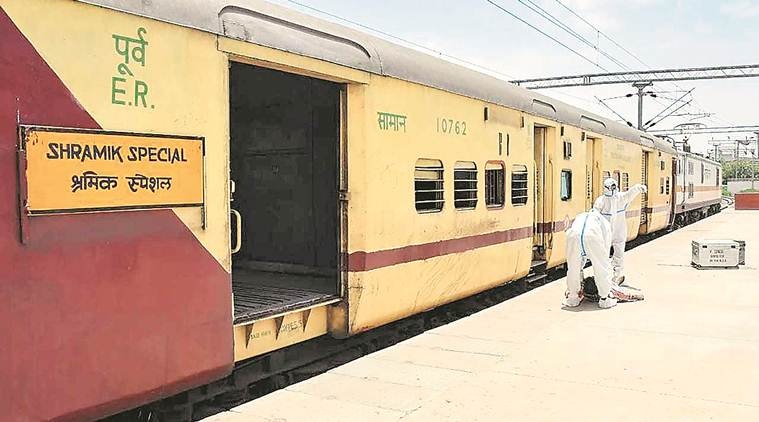 According to Pune District Collectorate officials, by Wednesday evening, 1,12,258 passengers – most of them migrant workers – had left for their homes in other states in 88 Shramik Special trains. (Representational Photo)
According to Pune District Collectorate officials, by Wednesday evening, 1,12,258 passengers – most of them migrant workers – had left for their homes in other states in 88 Shramik Special trains. (Representational Photo)
Of the 1.75 lakh inter-state migrants who had registered with Pune district authorities to go home, only 1.2 lakh migrants will end up taking trains when the Shramik Special programme for Pune district wraps up on Saturday. A total of 91 trains have departed from Pune district till Thursday evening and the authorities are planning to run four more trains by Saturday.
A number of migrant workers apparently took other means of transport such as buses, trucks, bikes or bicycles, and in some cases, walked all the way home. Authorities, however, are reluctant to concede that migrants used unauthorised means of transport in their desperation to reach home.
According to Pune District Collectorate officials, by Wednesday evening, 1,12,258 passengers – most of them migrant workers – had left for their homes in other states in 88 Shramik Special trains. The number is likely to go up to about 1.2 lakh, with three trains operated on Thursday and four more planned for Friday and Saturday.
Among the migrants who travelled via trains — fares for which were paid by the state government and Indian Railways — nearly 10 per cent had not registered with authorities beforehand but had reached the stations directly, with many camping there for days, before they were allowed to board the trains to make up for vacancies.
Apart from 1.2 lakh migrant workers who would have travelled in Shramik trains by Saturday, another 40,000 migrants were transported free of cost by authorities to neighbouring states such as Madhya Pradesh and Chhattisgarh in about 2,000 buses, said officials.
“Others may have taken private vehicles… a number of them had registered to travel home but have now decided to stay back and work in Pune,” said Sub-Divisional Officer Subhash Bhagade, who is co-ordinating the transport of inter-state migrants from Pune district.
When asked if he had any estimate of migrants who may have taken other means of transport to reach their home, District Collector Naval Kishore Ram said most of the registered migrants were transported via Shramik Special trains and about 5 to 10 per cent non-registered migrants also boarded the trains home.
“The last few trains we will send on Friday and Saturday will ply to West Bengal and Uttar Pradesh. We will stop the daily operations on Saturday. However, if more migrants approach us and the number is high enough to operate a special train, we will do that,” said Ram.
In the first three weeks of May, thousands of migrant labourers from Uttar Pradesh, Bihar, Jharkhand and West Bengal travelled in trucks – by paying Rs 3,500 to Rs 5,000 per person – as Shramik Special trains were running at an average frequency of only 4-5 trains per day.
This was due to the reluctance of destination states to provide a ‘no-objection letter’ to the sending state (Maharashtra) as the authorities in the home states were worried about incoming migrants being infected with Covid-19.
The lack of transport back home forced anxious migrants to take whatever means of travel they could find — trucks, tempos and auto-rickshaws – by paying hefty sums.
After May 19, when the Union government did away with the mandatory need to obtain the NoC from the destination state, the frequency of trains went up, especially to Uttar Pradesh and Bihar.